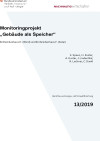Suchergebnisse
Monitoringprojekt „Gebäude als Speicher“. Einfamilienhaus H. (Wind) und Einfamilienhaus F. (Solar)

Monitoring und Vergleich der Leistungsfähigkeit der Thermischen Bauteilaktivierung in zwei bauähnlichen, bewohnten Einfamilienhäusern mit unterschiedlichen Energiequellen (Windstrom bzw. Solarenergie). Zentrales Anliegen ist es, die Funktionalität der Energieversorgung durch Wind- bzw. Photovoltaikstrom in Verbindung mit einem thermischen Speicher zu untersuchen. Die Ergebnisse liefern Erkenntnisse hinsichtlich Berechnungsannahmen, Anlagensteuerung sowie Umsetzbarkeit eines Smart-Grids.
Schriftenreihe
13/2019
S. Spaun, H. Kuster, A. Kuster, J. Lindenthal, R. Lechner, C. Dankl
Herausgeber: BMVIT
Deutsch, 53 Seiten
Downloads zur Publikation
SOFC4City - SOFC-waste heat utilization for buildings and industry
In this project the application of a solid oxide fuel cell (SOFC) for energy supply (heat and power) of urban areas will be investigated. Due to the high temperature level of the produced heat it would be possible to use this heat for the energy supply of different heat and power consumers (residential buildings, industrial plants, etc.). One aim is to provide the SOFC-heat at several temperature levels in order to establish the advantages of the fuel cell. On the one hand the legal and market-based conditions will be evaluated, on the other hand the technological feasibility will be scoured by the use of CFD-simulation of the heat production.
scaleFLEX - Scalable method for optimizing the energy flexibility of districts
Development of a decentrally organized automation method for improving the demand-side flexibility options of buildings and districts. The utilized data-driven algorithm promise high scalability and therefore low installation and operating costs. The developed method will be validated using different building types (high-tech office buildings, low-tech office buildings, residential buildings).
Stakeholderprozess der Initiative "Referenzarchitektur für sichere Smart Grids in Österreich"
Das Projekt bereitete die Entwicklung einer Smart Grids Referenzarchitektur für Österreich unter Einbindung aller relevanten Akteure auf. Aus den technisch-wissenschaftlichen Grundlagen wurde ein Prozess erarbeitet, der die Anforderungen vom Infrastrukturbetreiber, der Industrie bis zu Bedarfsträgern abholt und zu einer national akzeptierten und international ausgerichteten Referenzarchitektur abstimmt.
SeasonalGridStorage - Innovative seasonale thermal storages for urban district heating grids
Sensible storages, which are currently used in district heating networks for seasonal storage of excess heat (e.g. from solar thermal or industrial waste heat), exhibit high space demand, investment costs and heat losses. Within this project, concepts for using innovative storage technologies, e.g. thermochemical storages (TCS) having high heat densities and enabling pressure- and lossless storage, were developed and analyzed on a technological, economic and ecological basis. Additionally, the regulatory framework has been evaluated.
Eco.District.Heat - Potentials and restrictions of grid-bound heating systems of urban areas
Aim of the project Eco.District.Heat is to provide strategic decision-making support that enables Austrian towns and cities to deal with aspects of grid-bound heating (and cooling) systems in accordance with integrated spatial and energy planning from a holistic perspective when elaborating urban energy concepts.
SeasonalGridStorage - Innovative saisonale Wärmespeicher für urbane Wärmenetze
Die derzeit in Fernwärmenetzen eingesetzten sensiblen Speicher zur saisonalen Speicherung von überschüssiger Wärme (z.B. Solarthermie, industrielle Abwärme) weisen einen hohen Raumbedarf sowie hohe Investitionskosten und Wärmeverluste auf. In diesem Projekt wurden Konzepte zur Nutzung innovativer Speichertechnologien, wie thermochemische Speicher (TCS) mit hohen Energiedichten und der Möglichkeit der druck- und verlustlosen Speicherung entwickelt und mit Hilfe von Simulationsrechnungen in technischer, ökologischer und wirtschaftlicher Hinsicht untersucht sowie rechtliche Randbedingungen bewertet.
KLIMUR: climate-resilient urban resource management for the case study of Zukunftshof and Rothneusiedl
For the concept of the Zukunftshof, an innovative urban agriculture area, development scenarios for an integrated energy and resource cycle system are to be developed using optimisation tools and parametric design studies. A roadmap consisting of technical concepts and a coordinated financing strategy will provide the basis for a demo project that demonstrates in practice how the Zukunftshof can be the starting point and basis for resource-efficient and climate-resilient urban development.
KLIMUR - Klimaresilientes, urbanes Ressourcenmanagement am Fallbeispiel Zukunftshof und Rothneusiedl
Für das Konzept des Zukunftshofs, einer innovativen urbanen Landwirtschaft, sollen durch Optimierungstools und parametrischem Design Entwicklungsszenarien für ein integriertes Energie- und Ressourcenkreislaufsystem entwickelt werden. Eine Roadmap, bestehend aus technischen Konzepten und einer abgestimmten Finanzierungsstrategie, soll die Grundlagen für ein Demoprojekt liefern, das in der Praxis zeigt, wie der Zukunftshof Ausgangspunkt und Basis für eine ressourceneffiziente und klimaresiliente Stadtentwicklung sein kann.
scaleFLEX - Skalierbare Methode zur Optimierung der Energieflexibilität von Quartieren
Entwicklung einer dezentral organisierten Automatisierungsmethode zur Verbesserung der verbraucherseitigen Flexibilitätsoptionen von Gebäuden und Quartieren. Die dabei verwendeten datengetriebenen Algorithmen versprechen eine hohe Skalierbarkeit und damit geringe Installations- und Betriebskosten. Die entwickelte Methode wird anhand unterschiedlicher Gebäudetypen (High-Tech Bürogebäude, Low-Tech Bürogebäude, Wohngebäude) validiert.
AR-HES-B – Abwasserreinigung zur hybriden Energiespeicherung, Energiebereitstellung und Wertstoffgewinnung
AR-HES-B verfolgt das übergeordnete Ziel, technologische Änderungen der kommunalen Abwasserreinigung zu entwickeln, um die Abwasserreinigung vom Energieverbraucher hin zum hybriden Energieerzeuger und Energiespeicher und als Wertstoffbereitsteller zu erreichen. Durch das AR-HES-B Konzept positioniert sich die städtische Abwasseraufbereitung als eine wichtige Drehscheibe im überregionalen Energie- und Stoffaustausch.
Eco.District.Heat - Potenziale und Restriktionen leitungsgebundener Wärmeversorgung in Stadtquartieren
Ziel des Projektes Eco.District.Heat ist es, eine strategische Entscheidungshilfe für österreichische Städte zu entwickeln, mit der das Themengebiet leitungsgebundene Wärme- (und Kälte-) Versorgung in städtischen Energiekonzepten in Abstimmung mit energieraumplanerischen Fragestellungen aus ganzheitlicher Perspektive bearbeitet werden kann.
Stakeholder process of the initiative "Reference architecture for secure Smart Grids in Austria"
The project worked out the development of a smart grids reference architecture for Austria under involvement of all actors. Based on technological-scientific elements a process which met the requirements of stakeholders like operators of infrastructure, industry and also public agencies had been worked out to achieve nationally accepted and internationally orientated reference architecture.
